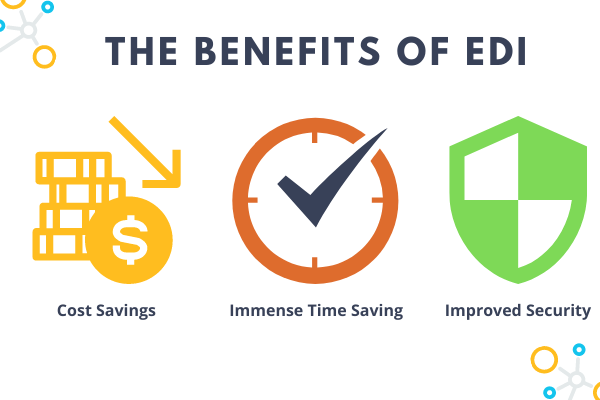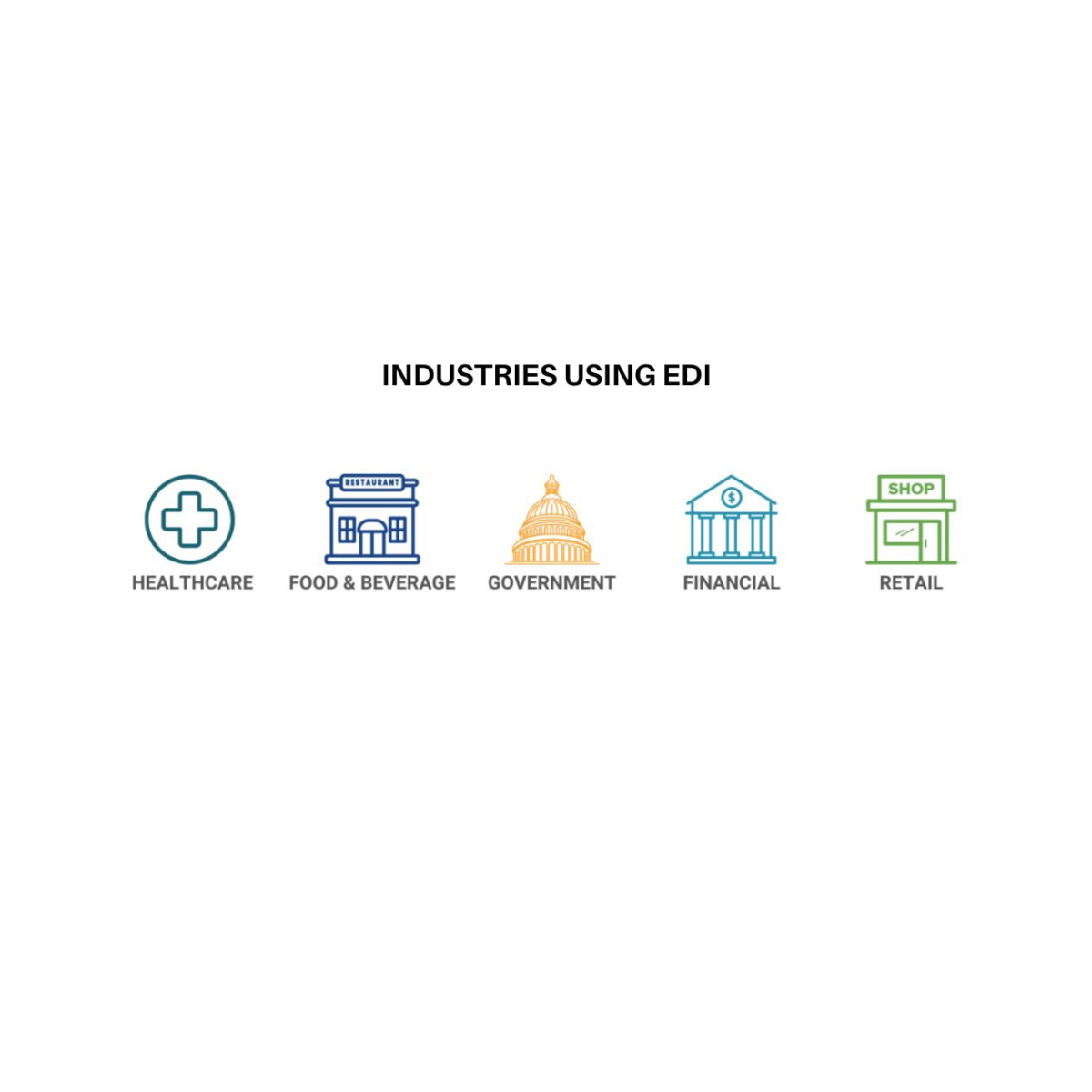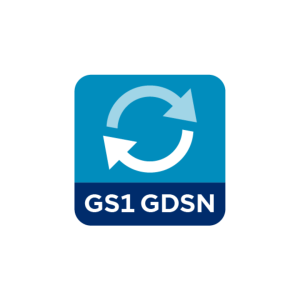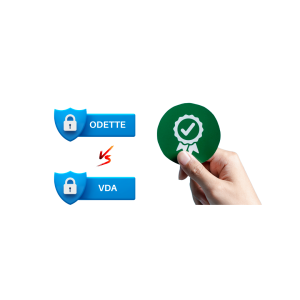Introduction
There are many industries, like retail, healthcare, logistics, and others who uses EDI to exchange thousands of B2B documents every day. These documents or transactions include invoices, purchase orders, shipping notices, payment details, acknowledgements, and many more. EDI helps these industries and their trading partners to be compliant with various industry standards and regulations, and exchange data automatically without human intervention, and avoid data entry errors, which in turn can result in costly chargebacks from partners.
Key Takeaways
EDI is widely used across many industries – Top 12 industries regularly use Electronic Data Interchange, including retail, manufacturing, healthcare, logistics, automotive, and banking. Any business that deals with lots of paperwork can benefit from it.
EDI automates document exchange – It allows businesses to automatically send and receive important documents like purchase orders, invoices, and shipping notices without manual data entry.
It offers significant business benefits – Companies using EDI save time and money, reduce errors in data transfer, improve security of information, and can trust that their data reaches its destination.
EDI works for businesses of all sizes – Both large corporations and small businesses can benefit from EDI solutions, which can be tailored to different company needs and budgets.
It supports sustainability efforts – By replacing paper documentation with electronic processes, EDI helps reduce paper waste and lowers the carbon footprint of business operations.
Who Uses EDI?
EDI has been used in the past primarily by automotive and retail businesses; however, in the past few years, the format has been more widely adopted by many industries, like manufacturing, healthcare, pharmaceutical, utility, and construction companies are good examples of EDI clients.
Here is a list of the top 12 industries that commonly utilize EDI daily,
- Retail and Consumer Goods
- Manufacturing and Supply Chain
- Logistics and Transportation
- Healthcare
- Automotive
- Banking and Finance
- Pharmaceuticals
- Energy and Utilities
- Insurance
- Government and Public Sector
- Telecommunications
- Food and Beverage
1. Retail and Consumer Goods
EDI is extensively used in the retail industry for activities such as purchase orders, invoices, advanced shipping notices, and inventory management.
Common EDI X12 Transactions Used in the Retail and Consumer Goods
EDI 860 – Purchase Order Change Request
EDI 852 – Product Activity Data
EDI 812 – Credit/Debit Adjustment
EDI 830 – Planning Schedule with Release Capability
EDI 832 – Price/Sales Catalog
2. Manufacturing and Supply Chain
Manufacturing companies rely on EDI for streamlining supply chain operations, including order processing, shipping notifications, and inventory control.
Common EDI X12 Transactions Used in the Manufacturing and Supply Chain
EDI 866 – Production Sequence
EDI 824 – Application Advice
EDI 846 – Inventory Inquiry/Advice
EDI 843 – Response to Request for Quotation
EDI 844 – Product Transfer Account Adjustment
3. Logistics and Transportation
EDI plays a crucial role in the logistics & transportation industry, enabling electronic communication between carriers, shippers, and customs authorities for tasks like freight bookings, shipping instructions, and customs documentation.
Common EDI X12 Transactions Used in Logistics and Transportation
EDI 204 – Motor Carrier Load Tender
EDI 990 – Response to a Load Tender
EDI 212 – Delivery Trailer Manifest
EDI 240 – Motor Carrier Package Status
EDI 222 – Cartage Work Assignment
4. Healthcare:
The healthcare sector utilizes EDI for claims processing, eligibility verification, electronic remittance advice, and coordination of benefits between healthcare providers, insurers, and government entities.
Common EDI X12 Transactions Used in Healthcare
EDI 270 – Eligibility, Coverage or Benefit Inquiry
EDI 271 – Eligibility, Coverage or Benefit Response
EDI 275 – Patient Information
EDI 277 – Claim Acknowledgment
EDI 278 – Health Care Services Review Information
5. Automotive
EDI is employed in the automotive industry for various processes, including purchase orders, production schedules, shipping notifications, and inventory management.
Common EDI X12 Transactions Used in the Automotive Industry
EDI 862 – Shipping Schedule
EDI 867 – Product Transfer and Resale Report
EDI 841 – Specifications/Technical Information
EDI 838 – Trading Partner Profile
EDI 861 – Receiving Advice/Acceptance Certificate
6. Banking and Finance:
Financial institutions leverage EDI for electronic funds transfers, payment processing, and remittance advice.
Common EDI X12 Transactions Used in Banking and Finance
EDI 821 – Financial Information Reporting
EDI 822 – Account Analysis
EDI 823 – Lockbox
EDI 827 – Financial Return Notice
EDI 828 – Debit Authorization
7. Pharmaceuticals
The pharmaceutical industry relies on EDI for electronic ordering and invoicing, product catalogs, and tracking of drug shipments.
Common EDI X12 Transactions Used in Pharmaceuticals
EDI 845 – Price Authorization Acknowledgment/Status
EDI 880 – Grocery Products Invoice
EDI 896 – Product Dimension Maintenance
EDI 888 – Item Maintenance
8. Energy and Utilities
EDI is used in the energy and utilities sector for activities such as electronic billing, meter data management, and energy trading.
Common EDI X12 Transactions Used in Energy and Utilities
EDI 814 – Request for Enrollment/Change in Service
EDI 248 – Account Assignment/Inquiry and Service/Status
9. Insurance
Insurance companies utilize EDI for policy administration, claims processing, and premium payments.
Common EDI X12 Transactions Used in the Insurance Industry
EDI 834 – Benefit Enrollment and Maintenance
EDI 999 – Implementation Acknowledgment
EDI 186 – Insurance Certificate Request
10. Government and Public Sector
Government agencies and public sector organizations employ EDI for procurement, invoicing, and financial transactions.
Common EDI X12 Transactions Used by Government Agencies
EDI 869 – Order Status Inquiry
EDI 870 – Order Status Report
EDI 890 – Contract and Rebate Acknowledgment
EDI 894 – Delivery/Return Base Record
11. Telecommunications
The telecommunications industry utilizes EDI for activities like order management, provisioning, and billing.
Common EDI X12 Transactions Used by Telecommunications
EDI 811 – Consolidated Service Invoice/Statement
EDI 848 – Material Safety Data Sheet
EDI 883 – Market Development Fund Allocation
EDI 805 – Contract Pricing Proposal
12. Food and Beverage
EDI is commonly used in the food and beverage industry for supply chain management, order processing, and invoicing
Common EDI X12 Transactions Used in the Food and Beverage Industry
EDI 875 – Grocery Products Purchase Order
EDI 894 – Delivery/Return Base Record
EDI 881 – Manufacturer Coupon Redemption Detail
EDI 879 – Price Information
EDI 895 – Promotion Announcement
EDI (Electronic Data Interchange) refers to the process of exchanging information electronically in a standardized format. In many cases, it saves thousands of hours (and countless dollars) for businesses with scores of documents to complete and file.
The Benefits of EDI

Basically, any type of business that deals with large amounts of identical paperwork/form data can directly benefit from adopting an EDI solution. The benefits of using an EDI system are clear:
- Immense savings in time
- Significant cost savings
- Reduced drain on resources overall
- Reduced error rates in data transfer (we almost want to say ‘eliminate’ here!)
- Improved security of data being transferred
- Reliability – you can have confidence that data is reaching its destination
Plus, with the electronic transfer of data, the likelihood of typographical errors decreases, as does the increase in time having to verify orders that have been filled out by someone with poor handwriting. It all adds up.
Security of information is critical. The adoption of EDI infrastructure is also largely due to convenience. EDI used over a VAN (Value Added Network) is an even more secure way to ensure the data is reaching its destination and is being managed properly.
A retailer attempting to implement a “just-in-time” inventory philosophy (that is, cutting down on overstocked inventory and replacing inventory in demand) would do well to implement an EDI solution.
Click for more EDI Resources
Also, Download the complete EDI guide for free.
Conclusion
Electronic Data Interchange (EDI) has become a cornerstone in modern business communication, transcending industry boundaries. Its versatility and efficiency make it a crucial tool for organizations of all sizes, ranging from small enterprises to multinational corporations. As EDI continues to evolve, its adoption by diverse sectors underscores its importance in optimizing business processes, enhancing collaboration, and facilitating seamless transactions between trading partners.
Ready to find out more about Commport EDI Solutions?
Download: EDI Buyers Guide
Unlock the full potential of your supply chain with our comprehensive EDI Buyer's Guide — your first step towards seamless, efficient, and error-free transactions
Frequently Asked Questions
EDI is widely used across various industries, including retail, manufacturing, healthcare, logistics, finance, and more. Its adaptability makes it suitable for any sector that engages in electronic data exchange with trading partners.
Both large corporations and small businesses can benefit from EDI. Many EDI solutions cater to the specific needs and scale of small enterprises, offering cost-effective options to streamline operations, reduce errors, and improve overall efficiency.
EDI’s standardized electronic format enables seamless communication and data exchange across borders. It eliminates language barriers, reduces manual processing time, and ensures compliance with international standards, making it an invaluable tool for organizations engaged in global trade.
Yes, EDI is designed to integrate with various business systems and software. It can be seamlessly incorporated into Enterprise Resource Planning (ERP), Warehouse Management Systems (WMS), and other applications, providing a cohesive and automated approach to data exchange.
By reducing the need for paper-based documentation and manual processes, EDI contributes to sustainability efforts by minimizing paper waste and lowering the carbon footprint associated with traditional document exchange. The shift to electronic communication aligns with environmental initiatives, making business processes more eco-friendly.





